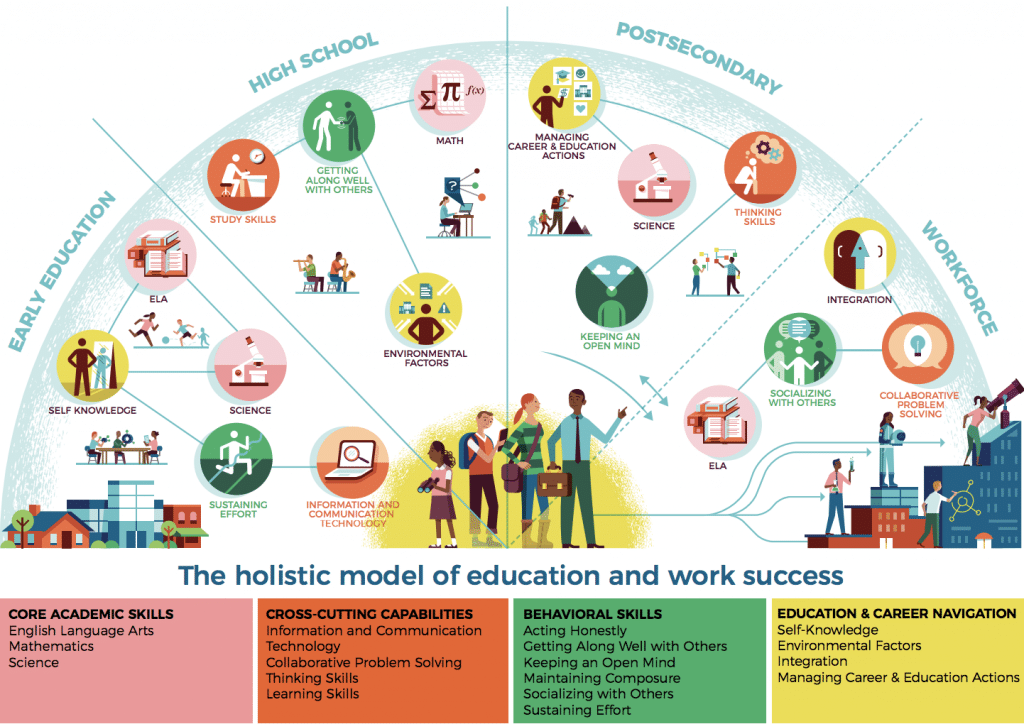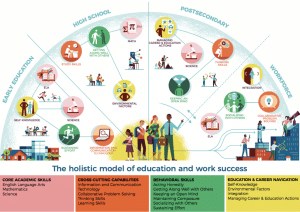ACT, Leader in Measurement, Shifts Focus to Student Success
CompetencyWorks Blog
This post originally appeared at Getting Smart on June 19, 2018.
For nearly 60 years, the ACT test has played an essential part in higher education admissions and scholarship decisions. For the last three years, the nonprofit developer of the ACT test has been expanding beyond traditional measurement to new and broader ways to promote education and workplace success.
“ACT is migrating from a focus on learning measurement to learner success,” said Jim Larimore who leads ACT’s Center for Equity in Learning (@ACTEquity).
Last year, ACT invited educational institutions to explore, evaluate and align to the ACT Holistic Framework, a research-based graduate profile that connects learning and assessment in order to personalize learning.
It organizes knowledge and skills organized into four broad domains in learning progressions from K through career:
- Core academic skills in the areas of literacy and language arts, mathematics and science.
- Cross-cutting capabilities, such as critical thinking, collaborative problem solving, and information and technology skills.
- Behavioral skills related to success in education and the workforce, such as dependability, working effectively with others, adapting, and managing stress.
- Education and career navigation skills related to education and career paths, including self-knowledge of abilities, values, likes, and dislikes; knowledge about majors and occupations; and skills related to education and career exploration, planning, and decision making.
 Acquiring Success Tools
Acquiring Success Tools
Under the leadership of Dutch-born CEO Marten Roorda, nonprofit ACT is making inroads in personalized and adaptive learning.
In 2016, ACT acquired OpenEd, the San Francisco-based startup with one of the largest collection of standards-aligned open resources and developed an adaptive assessment system. OpenEd’s capabilities enabled ACT to introduce ACT Academy™, a free online learning and test prep platform.
With a 2017 acquisition of ProExam, ACT gained access to a leading social and emotional learning powerhouse. It then introduced ACT Tessera, a multidimensional grade 6-12 assessment for social and emotional learning, and a digital credentialing capability.
ACT licensed a college readiness platform from NROC and introduced ACT CollegeReady to help students address their individual academic needs in math and English. ACT also pioneered supports to English learners for the ACT test, helping them obtain a college reportable score.
Promoting Social and Emotional Learning
“We’re at a tipping point for SEL in K-12,” said Jonathan Martin, ACT director of K12 Consulting Services. Martin believes that SEL in K-12 could be widely adopted very soon.
It took a quarter century, but there is growing evidence that Martin is right. The acronym was coined by Tim Shriver and Dan Goleman. Shriver was interested in social learning (as discussed in this podcast). Dan Goleman, the author of Emotional Intelligence, argued for emotional learning. They settled on social and emotional learning (SEL). In 1994, Shriver and Goleman were among a notable group of scholars and practitioners that founded The Collaborative for Academic, Social, and Emotional Learning (CASEL).
SEL “is the process through which children and adults acquire and effectively apply the knowledge, attitudes and skills necessary to understand and manage emotions, set and achieve positive goals, feel and show empathy for others, establish and maintain positive relationships, and make responsible decisions,” according to CASEL.
The ACT Holistic Framework (above) incorporates SEL into many of its 50 subcomponents and skills, explained research psychologist Alex Casillas. This enables measurement, early warning and interventions.
Martin hopes to see the majority of American elementary schools taking proactive steps to incorporate social and emotional learning across the curriculum and into the culture. He said high schools are coming around. (Many of Getting Smart’s 100+ middle and high schools worth visiting have fully incorporated SEL into culture and curriculum.)
Jim Larimore leads ACT’s Center for Equity in Learning, which hosted a recent convening on social and emotional learning, bringing together more than 250 students, teachers, scholars, practitioners and foundation executives to discuss equity through SEL and support student’s success in the transition to postsecondary.
“We’re committed to helping people achieve education and workplace success,” explained ACT CEO Marten Roorda. And while many of us are considering lexicon and measurement, “we know the importance of getting SEL right.”
While Larimore shares Jonathan Martin’s optimism about the rapid adoption of broader aims, he acknowledged “We are closer to the beginning of this journey than the middle or the end.”
Environmental Considerations
“Context shapes behavior,” said Dena Simmons (@DenaSimmons) Yale Center for Emotional Intelligence. And there’s a lot that gets in the way for many youth: poverty, low school funding, implicit bias, exclusionary discipline policies, low engagement and a lack of trauma-informed practices.
Emotional intelligence, explained Simmons, is ”The ability to monitor one’s own and others’ feelings, to discriminate among them, and to use this information to guide one’s thinking and action.” (Salovey and Mayer, 1990).
“You can’t be emotionally intelligent without being culturally responsive,” said Simmons. Responsive practices create opportunities to get to know students, invite their lives into teaching, and respect life experience as official knowledge.
Getting to equity will involve trade-offs, Simmons said. She asked, “What are you willing to give up?”
SEL as a Priority
Brooke Stafford-Brizard directs the Whole Child Initiative at CZI. They take a comprehensive view of youth development including academic, social and emotional, cognitive, identity, mental and physical health (see more from Jim Shelton). They are particularly focused on context variables (e.g., trauma, bias, homelessness) and equity.
On measuring the developmental factors that matter most, CZI supports Todd Rose’s research on individual differences and the Summit Learning platform which helps more than 330 schools develop and track habits of success.
Jenny Nagaoka (@JennyNagaoka, @UChiConsortium) outlined her readiness research which points to agency and integrated sense of identity as well as traditional competencies. She said educational transitions are particularly fraught and going to college is a big milestone. Students need a variety of developmental experiences supported by strong sustained relationships added Dr. Nagaoka.
Karen Pittman leads The Forum for Youth Investment and is one of 25 commissioners of the
Aspen Institute National Commission on Social and Emotional and Academic Development (@AspenSEAD). “The Commission is reimagining education based on how learning happens,” explained Pittman. Commission research has demonstrated that social and emotional learning matters, that skills are malleable and that schools play a critical role. The culminating report, out this fall will outline research, policy and practice recommendations.
Most importantly, said Pittman, “Learning won’t happen without safe and supportive environments.”
These days it’s not unusual to see social and emotional learning at the heart of an education conference. What is unusual is an attentional focus on SEL as an equity issue and the thoughtful way that the ACT team incorporated it into the summit design and facilitation. The summit and the emerging ACT Agenda make clear that SEL for equity is a priority.
See also:
- Mastery Credits? Mastery Transcript?
- Grades, College Admission, and Competency-Based Education
- Are Non-Traditional Diplomas and Transcripts Barriers to Implementing Personalized Learning?
Sydney Schaef, M.BA., M.Ed., is an educator, entrepreneur, and school design consultant. She currently works as a Mastery Learning Designer at reDesign and a design consultant for Building 21. She served at the School District of Philadelphia from 2013-2015 in the Office of New School Models, and prior to that, served as Founder and Executive Director of a 501c3 nonprofit organization that led innovative education and youth development programs in East Africa. Follow Sydney on Twitter at @sydneyschaef.
